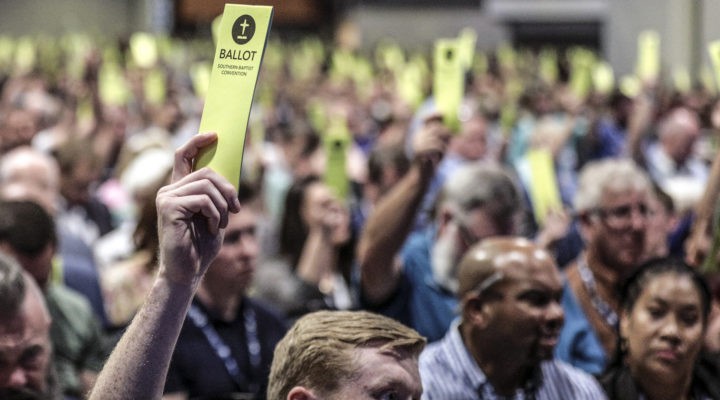The Southern Baptist Convention’s Executive Committee doesn’t favor a proposed constitutional amendment banning female pastors but wants messengers to the SBC annual meeting to vote on it anyway.
During a June 12 meeting in New Orleans one day before the opening of the annual meeting, Executive Committee members agreed to add to their report a request for an up-or-down vote on the amendment proposed last year by Virginia pastor Mike Law.
That amendment would add a sixth qualification to Article III of the SBC Constitution, which already describes member congregations as those with “a faith and practice which closely identifies with the convention’s adopted statement of faith,” meaning the Baptist Faith and Message. Article III also explicitly bans churches that “act to affirm, approve or endorse homosexual behavior” as well as those who do not “act in a manner inconsistent with the convention’s beliefs regarding sexual abuse” and do not “act to affirm, approve or endorse discriminatory behavior on the basis of ethnicity.”

Mike Law
Law and his allies want to add a constitutional stipulation that churches deemed to be “in friendly cooperation” with the SBC must not “affirm, appoint or employ a woman as a pastor of any kind.”
The majority view of the Executive Committee is that such an amendment is unnecessary because the Baptist Faith and Message already says, “The office of pastor is limited to men as qualified by Scripture.”
The most conservative faction of the SBC believes that doctrinal statement, while good, is not enough. To require member churches to “closely identify” with the Baptist Faith and Message leaves a loophole for some churches to give women job titles that include the word “pastor” in some form.
“The most conservative faction of the SBC believes that doctrinal statement, while good, is not enough.”
They want the SBC to be as firm in its stance against women as pastors as it is against homosexuality and racism.
For the Executive Committee to put forward for a vote an item it does not recommend is highly unusual. Typically, the central organizing body of the SBC only puts forward recommendations it favors.
Thus is the dilemma of denominational leaders in the present moment.
But even if convention messengers do not adopt the constitutional amendment, that will not settle another pressing issue for messengers — whether two churches expelled for ordaining women and allowing women to preach should be reinstated. Both Saddleback Church in Southern California and Fern Creek Baptist Church in Kentucky plan to appeal their expulsions.
Saddleback is by far the highest-profile church in this fight — and likely the highest-profile church in the entire denomination apart from the fight. It was, before its expulsion in February, the largest church in the SBC. And its founding pastor, Rick Warren, may be the best-known Baptist pastor in America.

Rick Warren addresses messengers to the SBC annual meeting in 2022. (Photo courtesy of The Baptist Paper)
The two churches were expelled on the basis of the Baptist Faith and Message, as cited in the Constitution. Thus, if the constitutional amendment passes, neither expelled church has a case for restitution at all. But if the constitutional amendment fails, both churches could continue to argue that “closely identifies” does not demand rigid conformity.
That’s the message Warren has been making via an all-out marketing campaign — despite efforts by Executive Committee staff and other denominational leaders to deny him a platform and despite what he believes is a sustained effort by a single seminary president to prosecute the case against him and his megachurch.
Tuesday, as messengers enter the convention hall, they will be handed a document prepared by Warren titled “Messenger’s Guide to Understanding the Executive Committee vs. Saddleback Church.” Warren said he had asked for the document to be included in packets for registered messengers that include all manner of solicitations and promotions but was denied.
The old-fashioned flyer prominently quotes Proverbs 18:13 — “It is foolish to decide before knowing the facts.”
The old-fashioned flyer prominently quotes Proverbs 18:13 — “It is foolish to decide before knowing the facts.”
It says Saddleback Church “is asking the messengers to vote no against the Executive Committee’s ruling” for four reasons:
- The ruling violates Article IV of the SBC Constitution.
- The ruling violates the instructions of the Baptist Faith and Message.
- The ruling violates the intentions of the SBC’s founders.
- The ruling violates the 2013 Truth, Trust and Testimony Affirmations, a reference to a previous truce in a battle between resurgent Calvinist and non-Calvinists in the SBC.
That fourth point illustrates one of the most profound changes that has happened in the SBC since “moderates” were driven out of the convention between 1979 and 2000 by the “conservative resurgence.” Along with that conservative movement came a brand of neo-Calvinism that previously had been a tiny fringe of the denomination for a century.
Al Mohler — president of Southern Baptist Theological Seminary since 1993 and currently Rick Warren’s greatest behind-the-scenes nemesis — has been the intellectual front man for that movement for three decades and has shaped new generations of young pastors who adhere to Calvinism.
The greatest opposition to allowing the Baptist Faith and Message to be the sole guide on the issue of women in ministry comes from SBC Calvinists.
Warren and Saddleback Church represent the opposite of Calvinism — the warm-hearted pragmatic evangelism of the Southern Baptist glory days. Thus, Warren’s message at first was mainly about the Great Commission, baptisms, discipleship and missions while his opponents focused on interpreting Greek words in the New Testament to ensure doctrinal purity.
The 2013 Truth, Trust and Testimony Affirmations may not have held after all — which could be why members of the SBC Executive Committee chose not to put a thumb on the scale of this question. The stakes are high.
Related articles:
Female pastors: Appointed or apostate? Southern Baptists decide | Opinion by Melody Maxwell
Thirty years later, no one has reshaped the SBC more than Albert Mohler | Analysis by Mark Wingfield
Remember that time three women won the preaching award at Southern Seminary? | Analysis by Brad Bull


